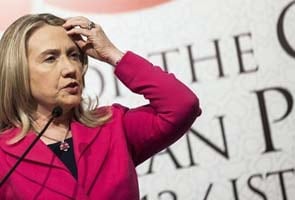
Washington:
The United States is prepared to take targeted steps to ease sanctions banning the export of U.S. financial services and investment in Myanmar to respond to progress in the Southeast Asian country's democratic transition, U.S. Secretary of State Hillary Clinton said on Wednesday.
Clinton said the United States was also ready to enact other measures to encourage democratic reforms in Myanmar, saying this month's successful parliamentary by-elections represented real change in the country after decades of military rule.
"We fully recognize and embrace the progress that has taken place and we will continue our policy of engagement," Clinton said in a statement to reporters.
The Obama administration has promised Myanmar's leaders that it would match "action for action" in response to democratic reforms, and the package Clinton unveiled on Wednesday reflected a modest first step toward lifting the complex web of U.S. sanctions that have kept the country isolated for decades.
Clinton said the United States would seek to name a new U.S. ambassador to Myanmar after an absence of two decades, establish a Myanmar office of the U.S. Agency for International Development (USAID) and support a "normal country program" for Myanmar by the U.N. Development Program.
She said the United States would also allow private U.S. aid groups to pursue a broad range of non-profit activities in Myanmar on projects such as democracy building, health and education.
Select Myanmar government officials and lawmakers will also receive permission to visit the United States, she said, relaxing a long-standing visa ban.
Clinton said the United States was also committed to "beginning the process of a targeted easing of our ban on the export of U.S. financial services and investment as part of a broader effort to help accelerate economic modernization and political reform."
Economic analysts say that it will take time for the United States to unravel the full scope of its sanctions on Myanmar, first imposed in 1988 and subsequently expanded by five laws and four presidential directives.
While some sanctions can be lifted by fiat, others are tied to specific progress on issues ranging from drug trafficking and money laundering to preventing the use of child soldiers - making them more difficult to remove.
Clinton, who visited Myanmar in December, said the government's continued efforts toward political reform were "precisely the kind of step" that the Obama administration hoped to encourage when it began its outreach to Myanmar last year.
The April 1 parliamentary by-elections, which saw Myanmar pro-democracy icon Aung San Suu Kyi gain a seat in the lower house and a landslide win for other members of her party, were "a dramatic demonstration of popular will," she said.
"The United States is committed to taking steps alongside the Burmese government and people as they move down the road of reform and development," Clinton said.
(Copyright Thomson Reuters 2012)
Clinton said the United States was also ready to enact other measures to encourage democratic reforms in Myanmar, saying this month's successful parliamentary by-elections represented real change in the country after decades of military rule.
"We fully recognize and embrace the progress that has taken place and we will continue our policy of engagement," Clinton said in a statement to reporters.
The Obama administration has promised Myanmar's leaders that it would match "action for action" in response to democratic reforms, and the package Clinton unveiled on Wednesday reflected a modest first step toward lifting the complex web of U.S. sanctions that have kept the country isolated for decades.
Clinton said the United States would seek to name a new U.S. ambassador to Myanmar after an absence of two decades, establish a Myanmar office of the U.S. Agency for International Development (USAID) and support a "normal country program" for Myanmar by the U.N. Development Program.
She said the United States would also allow private U.S. aid groups to pursue a broad range of non-profit activities in Myanmar on projects such as democracy building, health and education.
Select Myanmar government officials and lawmakers will also receive permission to visit the United States, she said, relaxing a long-standing visa ban.
Clinton said the United States was also committed to "beginning the process of a targeted easing of our ban on the export of U.S. financial services and investment as part of a broader effort to help accelerate economic modernization and political reform."
Economic analysts say that it will take time for the United States to unravel the full scope of its sanctions on Myanmar, first imposed in 1988 and subsequently expanded by five laws and four presidential directives.
While some sanctions can be lifted by fiat, others are tied to specific progress on issues ranging from drug trafficking and money laundering to preventing the use of child soldiers - making them more difficult to remove.
Clinton, who visited Myanmar in December, said the government's continued efforts toward political reform were "precisely the kind of step" that the Obama administration hoped to encourage when it began its outreach to Myanmar last year.
The April 1 parliamentary by-elections, which saw Myanmar pro-democracy icon Aung San Suu Kyi gain a seat in the lower house and a landslide win for other members of her party, were "a dramatic demonstration of popular will," she said.
"The United States is committed to taking steps alongside the Burmese government and people as they move down the road of reform and development," Clinton said.
(Copyright Thomson Reuters 2012)
Track Latest News Live on NDTV.com and get news updates from India and around the world

